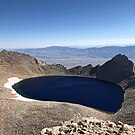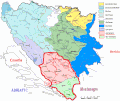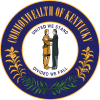Portal:Lakes
The Lakes Portal
A portal dedicated to Lakes
Introduction

A lake is a naturally occurring, relatively large and fixed body of water on the Earth's surface. It is localized in a basin or interconnected basins surrounded by dry land. Lakes lie completely on land and are separate from the ocean, although they may be connected with the ocean by rivers, such as Lake Ontario. Most lakes are freshwater and account for almost all the world's surface freshwater, but some are salt lakes with salinities even higher than that of seawater. Lakes vary significantly in surface area and volume.
Lakes are typically larger and deeper than ponds, which are also water-filled basins on land, although there are no official definitions or scientific criteria distinguishing the two. Lakes are also distinct from lagoons, which are shallow tidal pools dammed by sandbars at coastal regions of oceans or large lakes. Most lakes are fed by springs, and both fed and drained by creeks and rivers, but some lakes are endorheic without any outflow, while volcanic lakes are filled directly by precipitation runoffs and do not have any inflow streams.
Natural lakes are generally found in mountainous areas (i.e. alpine lakes), dormant volcanic craters, rift zones and areas with ongoing glaciation. Other lakes are found in depressed landforms or along the courses of mature rivers, where a river channel has widened over a basin formed by eroded floodplains and wetlands. Some parts of the world have many lakes formed by the chaotic drainage patterns left over from the last ice age. All lakes are temporary over long periods of time, as they will slowly fill in with sediments or spill out of the basin containing them. (Full article...)
Selected article -

Green Lake is a natural tidal lake in Calhoun County, Texas, on the Guadalupe River flood basin. Known for its greenish waters, from which its name derives, the lake is located 12 miles (19 km) west of Port Lavaca and 22 miles (35 km) south of Victoria on the Gulf Coastal Plain. Despite being less than 3 miles (4.8 km) from the coast of San Antonio Bay, its waters are fresh. It is the largest natural freshwater lake entirely in Texas, covering an area of approximately 10,000 acres (40 km2).
Separated from San Antonio Bay by the Guadalupe River delta around 2,200 years ago, a wetland ecosystem supporting a wide variety of waterfowl developed along the lake shore and the Guadalupe River delta. Archaeological evidence supports claims of Karankawa settlement.
An affluent 19th-century agricultural community of the same name established near the lakeside in the mid-19th century, but dwindled in status, becoming virtually abandoned in the aftermath of the American Civil War. It was strategically important during the early stages of the war, due to its proximity to fresh water and the Gulf of Mexico. After reaching its low point during the Great Depression, the lakeside community modestly rebounded in 1947 following the nearby discovery of oil. A lake of the same name and with a similar history is featured in the 1998 novel Holes. (Full article...)General topics
| Lake zones |
|---|
| Lake stratification |
| Lake types |
| See also |
Need assistance?

Do you have a question about lakes that you can't find the answer to? Consider asking it at the Wikipedia reference desk.
Categories
More articles
Associated Wikimedia
The following Wikimedia Foundation sister projects provide more on this subject:
-
Commons
Free media repository -
Wikibooks
Free textbooks and manuals -
Wikidata
Free knowledge base -
Wikinews
Free-content news -
Wikiquote
Collection of quotations -
Wikisource
Free-content library -
Wikiversity
Free learning tools -
Wiktionary
Dictionary and thesaurus
External media

- World Lake Database. International Lake Environment Committee Foundation. – provides a searchable database
- Global Lakes and Wetlands Database. World Wide Fund for Nature. – available for free download






























































